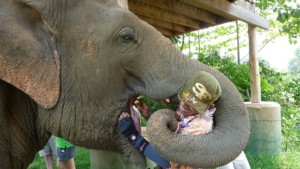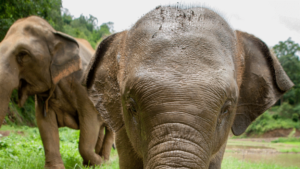More shades of grey in elephant tourism
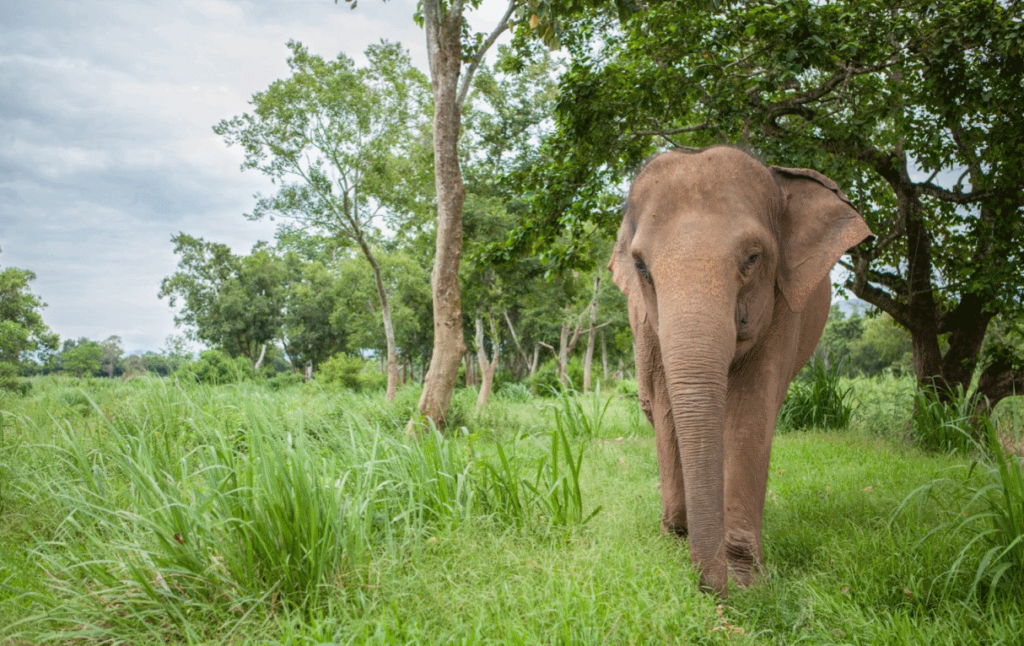
“The fact that someone employed in the elephant riding industry is writing critically about the negative impacts of Responsible Tourism on his business model just annoys me. […] To me, this post is like Sea World grousing that Blackfish is hurting the Orcas it used to make billions of dollars each year. The problem isn’t the boycott: The problem is the irresponsible tourism practices that are being boycotted. Change your business model!!!”
To be fair, the vested interests of writers and commentators in the media are worth knowing about (and John Roberts’ connections are fully disclosed on his post). However, to ignore a presented argument and angrily assume that there is a cynical motivation behind a conclusion that doesn’t fit one’s worldview is … irrational problematic? That shutting-down style of debate certainly hasn’t helped the cause of the progressive left in recent times.
For balance, here’s what Geoffrey Lipman wrote about John Roberts in a comment on the blog post itself: “I would believe anything John says about elephants … he has the same passion for their well being as any conservationist I have met in my life. And there have been many great ones.”

Geoffrey Lipman’s comment on “Elephant tourism: The harms of received wisdom”
The “GT” Blog certainly doesn’t have any skin in this game. As I tell prospective “GT” Insights contributors, the blog is simply trying to connect the dots between rhetoric and reality, theory and practice when it comes to tourism’s potential to do good stuff.
Elephant tourism’s shades of grey
So here’s yet another perspective from a group of people who have to deal with the issue of elephant tourism on a daily basis:
“The welfare of captive elephants is a topic of intense debate among animal managers, conservationists, scientists, the general public, animal welfare/rights groups and the media. Common concerns, especially on welfare, raised about elephant tourism in particular are complex in their nature and impact, and call for urgent scientific evaluation as well as for realistic solutions to ensure the sustainable and ethical management of captive elephants in the future.”
So begins the 2017 Update (PDF 17.2 MB) of the Asian Captive Elephant Working Group (ACEWG), a group of “regional elephant specialists, veterinarians, researchers and conservationists” formed in June 2015.
In the document, the ACEWG acknowledges valid concerns around elephant welfare:
“For the tourist camps in ASEAN (Association of Southeast Asian Nations) countries, there are currently no acknowledged and/or widely used guidelines for best practices for the management and care of elephants. This has resulted in a large number of facilities operating with an insufficient capacity to manage captive elephants. Such facilities are extremely vulnerable to criticism, creating false assumptions about proper captive elephant management and undermining the reputation of good facilities.”
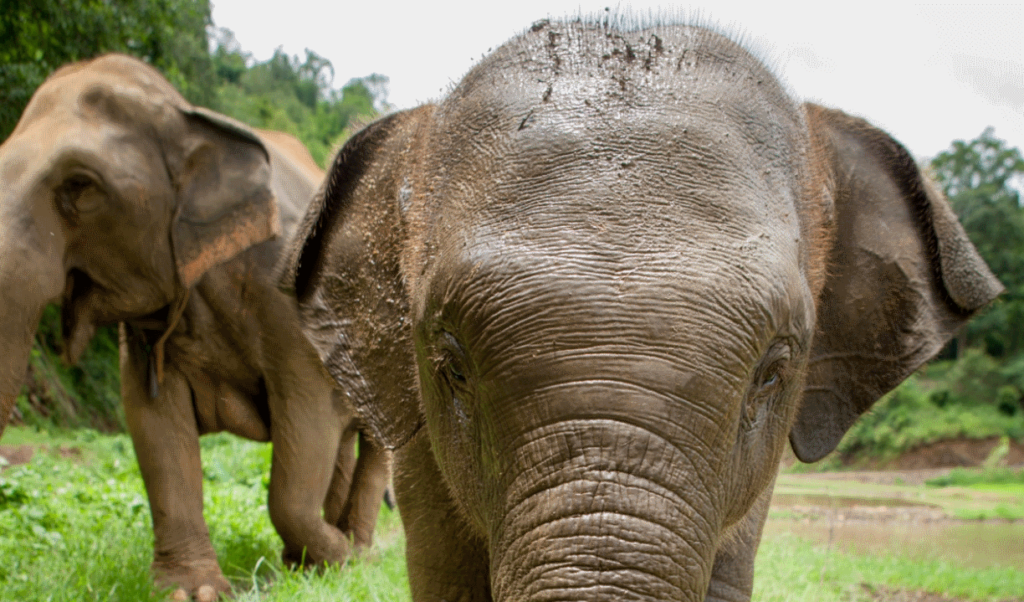
ACEWG appears to be tackling valid concerns around elephant tourism head-on. Image: Snipped from the ACEWG 2017 Update, which you can download below.
ACEWG also points out some inconvenient truths about all of this:
“Closing all elephant tourism camps is not a realistic option” and an increasing number of captive elephants depend on employment in the tourism industry. Tourism, however, does provide favourable conditions for learning about elephants and therefore, perhaps, improving care and training protocols.
ACEWG understands that elephants are intelligent, mobile, social — and potentially dangerous — animals that require professional management and care protocols. However more research is required to guide the development of such protocols. Furthermore, because the relationship between humans and elephants has existed for thousands of years and practices have been passed down through the generations, ACEWG reckons it will take time to transfer new knowledge and standards of professionalism to mahouts.
ACEWG also acknowledges the need for effective elephant registration “to reduce the illegal capture and trade of elephants” and a certification program to “enforce best practices for welfare, improve training opportunities for mahouts, and provide a means by which camps that follow best practices are rewarded by greater financial viability”.
Do boycotts do more harm than good?
The point of John Roberts’ “GT” Insights contribution is consistent with ACEWG. He reckons that as conscientious travellers — including those who care about animal welfare — boycott elephant tourism camps, so goes a potentially important source of encouragement for owners and mahouts to adapt and modernise their practices.
As he tweeted on June 27, “By all means encourage elephant camps to improve, but staying away from them isn’t helping eles at all: http://bit.ly/2shnzGO @GoodTourism”
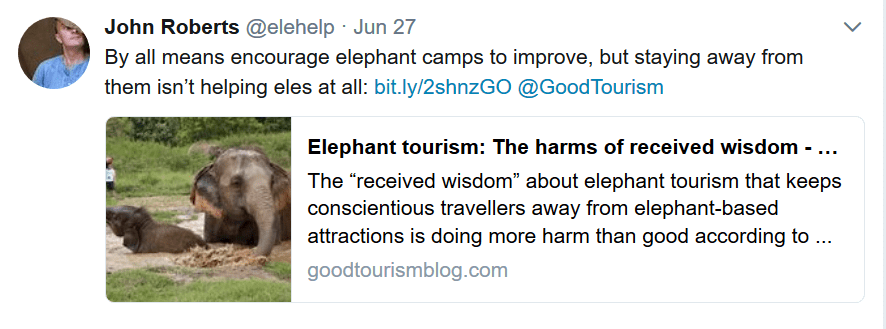
John Roberts’ tweet from @elehelp, June 27, 2017
ACEWG’s stated goals
ACEWG claims to be supported by a range of different stakeholders, including universities and wildlife and conservation groups. Its stated goals are to:
- Ensure sustainable populations are only created from already existing captive elephant groups.
- Promote a high quality of life for captive elephants in ASEAN elephant range countries by supporting positive elephant welfare practices, ensuring that the physical and mental needs of elephants are met, and promoting proper environmental stimulation, enrichment and social group living.
- Eliminate the capture of wild elephants for any commercial purpose whatsoever from within ASEAN countries.
- Bring together knowledgeable/experienced parties to address all matters related to ensuring a sustainable quality of life for captive elephants in ASEAN elephant range countries.
- Improve captive elephant welfare by supporting quality mahouts and protecting elephants from abuse and misuse by humans.
- Support the creation of an Elephant Welfare Standard for captive elephants in ASEAN countries providing camp managers and the public with a baseline for elephant care as well as guidelines & support for camps to exceed this standard.
- Identify sustainable means for covering the costs of captive elephants while encouraging ethical management and conservation.
- Maintain the traditions and culture surrounding elephant care while developing effective and humane elephant management plans that respect mahout tradition and its cultural history and significance.
- Encourage good business practices, and strengthen business models for captive elephant management based on high welfare standards.
- Enhance education and awareness of issues related to wild and captive elephants, and recognise the opportunities the captive populations present for species conservation.
- Encourage tourism facilities to use accurately researched and conveyed science and education to promote wild elephant and habitat conservation and good captive elephant welfare practice to the public.
Featured image: Snipped from the Asian Captive Elephant Working Group 2017 Update PDF, which you can download below.
Download
Asian Captive Elephant Working Group 2017 Update (PDF 17.2 MB).
Related posts



